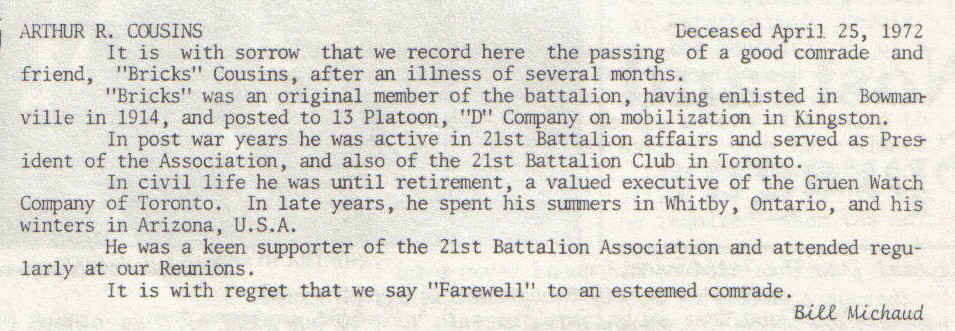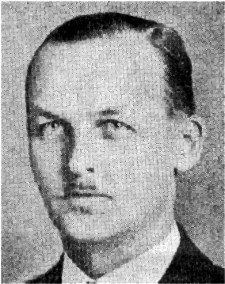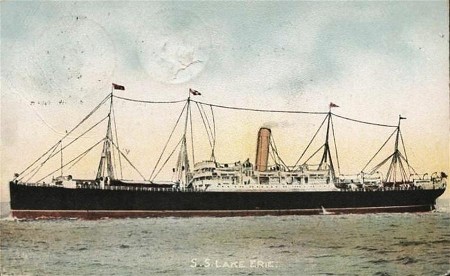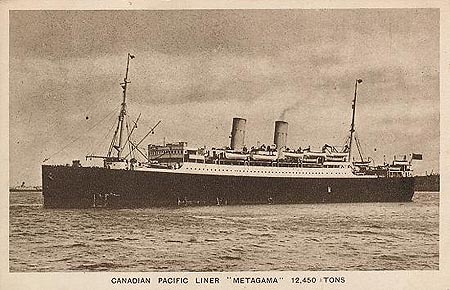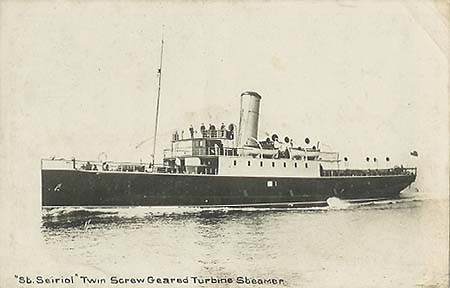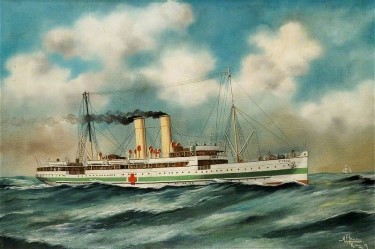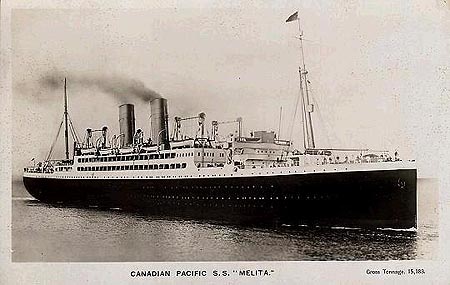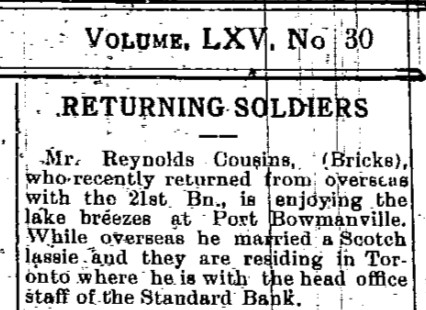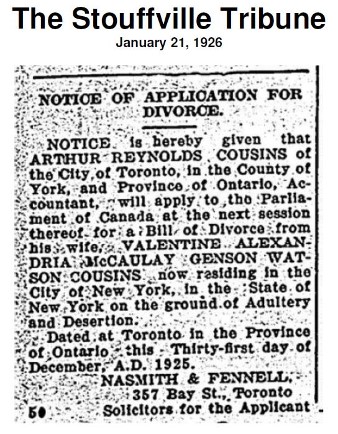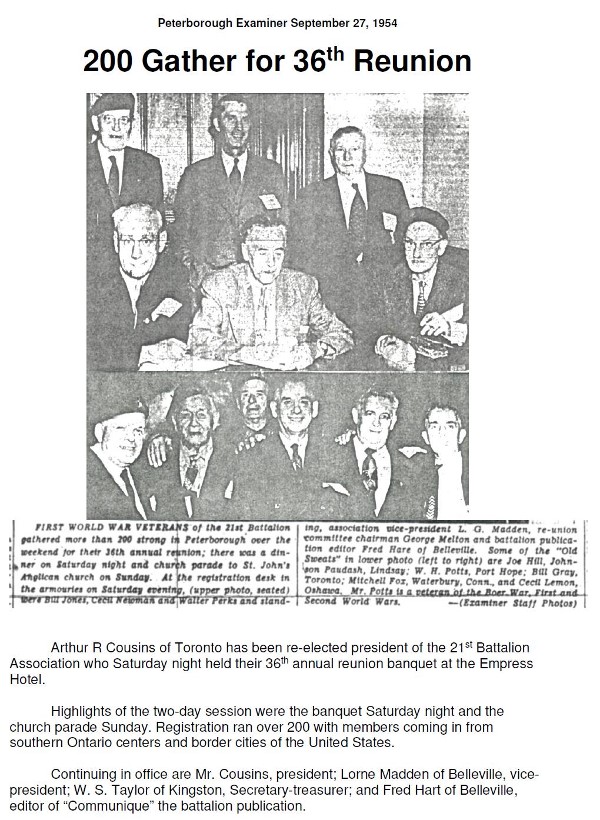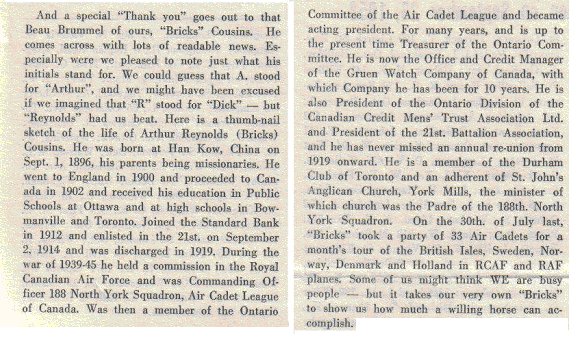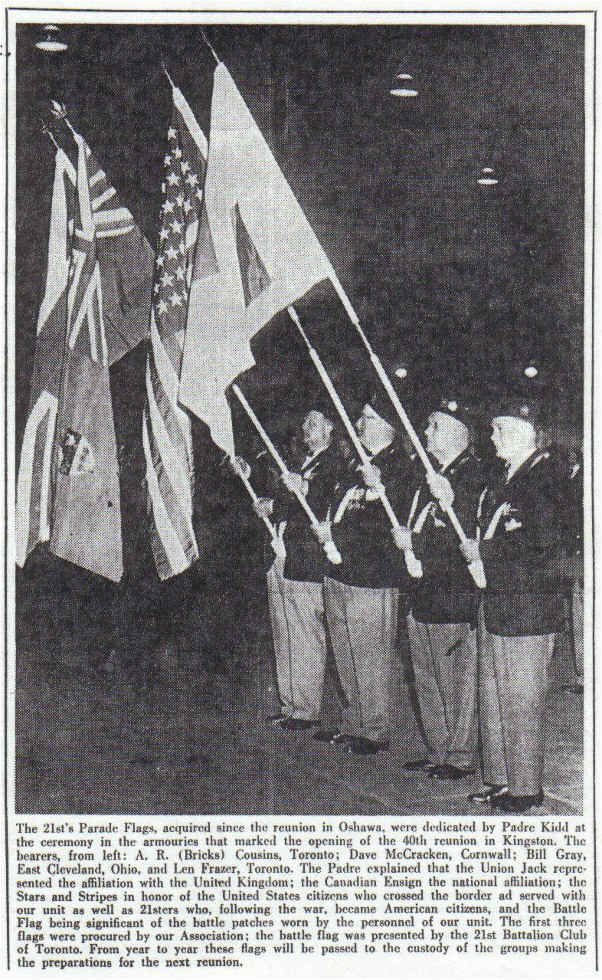|
Q
|
We are talking this
evening with Mr AR Cousins who, in the First World War, was with the 21st
Battalion
|
|
A
|
In Kingston. We were around there for about a week or so and
then they formed the 21st Battalion which they had planned before. We got out of these old uniforms and into the
khaki and then made up the company with a group from Ottawa, Cobourg, Peterborough and all
down through Eastern Ontario. They made us
up into eight companies and that made the 21st Battalion
|
|
Q
|
This period in
Kingston, were you able to be accommodated?
|
|
A
|
The second half of the
battalion, we were in a cereal building, an old cereal building up on the waterfront.
|
|
Q
|
You mean an old –
|
|
A
|
Where they stored
cereals, grains of different kinds, a kind of an elevator but it wasn’t actually, it
didn’t have the pipes or anything. I
don’t know just what they kept in it. It’s
still there.
|
|
Q
|
A great smell, a place
like that?
|
|
A
|
Yes, but we soon got
rid of that. They put four bunks high in
there, you see, and put us in there and they had the dining room on the main floor and the
canteen and then fenced it in. It was right
beside the locomotive works. We walked right
out to the pier, you see. We used to do
our physical exercises there in the morning, have breakfast and then the boys would go up
to the park in front of the law courts to do our drill, a lot of it, on grass.
|
|
Q
|
I know that location
very well
|
|
A
|
Then we went to the
barracks of course where the armouries are now. The
right half of the battalion were over there and we used to go up there and join them and
then do our battalion drill and, of course, we walked up and down Princess Street enough
to be called the Princess Pets. We got that
all the time. Our Colonel, of course, was
William St Pierre Hughes who was a brother of Sir Sam, you see, and we got a lot of
roasting about that. Anything that we did
that somebody else didn’t get was because of the brother.
|
|
Q
|
Was there a lot of
controversy about Sir Sam Hughes, do you recall?
|
|
A
|
Only on account of the
rifle, you know, the Ross rifle.
|
|
Q
|
Was it a good rifle,
did you have it in the beginning?
|
|
A
|
It was lovely for
target shooting, it was wonderful for that but, under rapid fire, I remember at Messines,
in fifteen minutes there wasn’t a gun that would shoot, in fifteen minutes. If Jerry had come over then he could have waked
right through us, we didn’t have a defence except the bayonets.
|
|
Q
|
Now, let’s not get
over to Messines. Let’s hang on a second
and find out what happened there at Kingston. Were
you well up to strength? Did your battalion
begin to achieve some morale there?
|
|
A
|
Oh yes, we put on some
great shows there and got our Colours there, you know, and our relatives all went down
there for a big “At Home”. We were
going overseas, you see, any week, any day but we were there all
Fall and all Winter. We didn’t leave there until May and we were
disgusted.
|
|
Q
|
May of 19-
|
|
A
|
1915. We didn’t think we were ever going to get
over, we thought the war was going to be over before we got there.
|
|
Q
|
Did the 21st
Battalion have any other name?
|
|
A
|
No, now our unit is the
Prince of Wales Light Infantry of Kingston and they’re still in existence and they
have our Colours in safe keeping down there.
|
|
Q
|
You never did get a
nickname like “The Mad Fourth” or anything?
|
|
A
|
No, we had “The
Fighting Two and The Dashing One, The Dashing One and the Fight Two”. No, The Fighting Two and the Dashing One. No, we didn’t have, like the VanDoos, you
know of the 22nd. They were in our
brigade, you see. They were really an
excitable bunch, they always started something wherever they were.
|
|
Q
|
You were in pretty
close contact with them too?
|
|
A
|
Oh yes, the 19th,
21st and 22nd were in the one brigade.
|
|
Q
|
Did you get along well
with the French Canadians?
|
|
A
|
Oh yes, fine, lots of
fun.
|
|
Q
|
I’ve always heard
that.
|
|
A
|
Of course we had a lot
of French Canadians with us too, you know. We
had a company from Ottawa which had a lot of French fellows in it and I was surprised. Mind you, they were all good-hearted fellows. I got along well because I was only a kid from the
bank. I wasn’t very rough, you know, and
they helped me out an awful lot, a lot of things they did for me, for instance, I always
traded my rum issue for their jam because I didn’t like rum at the time. In Kingston, we were there as I said until May,
and then we got going.
|
|
Q
|
Did you go as a
brigade?
|
|
A
|
The 20th and
19th were there in Sandling when we arrived.
We went over in single boats, we didn’t go over as a convoy like they did
later or like they did in the last war. We
mounted machine guns on the Metagama. We
went over on the Metagama with a unit of medical people form Montreal and we mounted the
machine guns on the deck. Of course I doubt
very much whether they’d have done much good but they were there.
|
|
Q
|
At least you felt you
had something.
|
|
A
|
Sure, we had something.
|
|
Q
|
Anything eventful
happen?
|
|
A
|
Not at all, not at all. We got over there and never saw a thing.
|
|
Q
|
Pretty boring for
troops on a boat.
|
|
A
|
Oh yes. We had boxing matches and that kind of thing. A lot of the boys got seasick but we didn’t
mind it, I didn’t mind it at all. We got
over there and it took us about ten days.
|
|
Q
|
I suppose this was the
first time you’d been away from Canada.
|
|
A
|
No, I’d come over
here, you see.
|
|
Q
|
You’re British
originally?
|
|
A
|
Yes, I’m British
but I was born in China. My dad was a
missionary over there. I didn’t come to
Canada until I was eight.
|
|
Q
|
Now, let’s see, we
got you to Sandling and there is the brigade forming up.
Did you have any instruction coming in from troops or were you entirely on your
own?
|
|
A
|
We were entirely on our
own. We had some First Division fellows who
came and helped us in training, you know, and we were all in Sandling, the whole brigade. In fact the whole Second Division was made up then
in England, you see. I’m not quite sure
where they all were. Some were in Bramshott,
I think Our brigade was in Sandling
just outside of Folkestone. Folkestone or
Hythe was the place we went. The beer in
Hythe, that’s where I was introduced to drinking beer.
I’d never had a drink of beer before in my life before I got there. These fellows going over, you know, all Englishmen
you see, were telling us about the wonderful beer they had over there and they were dying
to get hold of some this beer so the first thing we did was march down to Hythe to see
what the beer was like and it was good. I can
remember I had one pint and I really felt it, as a kid you know.
|
|
Q
|
I think drinking beer
like that the first time, you really have to learn. It
takes a little while.
|
|
A
|
No, I wasn’t too
fond of it. Well, we had from May until
September in England in training. I
didn’t see too much of it though because was Company Clerk and I kept the Company
records so I was in the office an awful lot but I did get some training.
|
|
Q
|
You’d got to be an
NCO?
|
|
A
|
No, they wanted me to
be one but I didn’t because I was too much of a kid.
I didn’t think it was right, it would look funny. We were inspected by the King there and by
Kitchener and we had a sham battle. We
marched on and took Ashford one day. In
fact when we were back in Kingston we marched from Kingston to Gananoque one day and were
entertained by the ladies of the churches down there that night and then walked back the
next day, marched back the next day. That
was tough.
|
|
Q
|
So, in September you
got across the Channel
|
|
A
|
Yes, we marched from
Sandling to Folkestone and boarded a tug or a small boat there and we got in pure rain,
just raining cats and dogs. We got soaked. When we got on, we couldn’t sit down, we had
to stand up there were so many of us. There
was no room to sit down so we stood up. We
got about halfway across when a destroyer came along and turned us back. They said there were subs around or something so
we had to go back until daylight and we stood or sat or leaned or whatever we could till
morning, till daylight, and then we went over to Boulogne and they put us up on the hill
at Boulogne and let us lay down and dry. Boulogne
was very nice but it was up on a hill. I
remember going up, the ladies or the women of the town were all out on the side offering
beer and wine to us.
|
|
Q
|
Later on they
didn’t do that but they were still doing it?
|
|
A
|
Yes, they were doing
then. We got up there and to dried out and
then they marched us down to the railway and put us on the train and we went to St Omer
from there by train in boxcars. We got out
there in the middle of the night I think it was and we marched from there right up the
line.
|
|
Q
|
You don’t mean you
went right in?
|
|
A
|
No, we went to Tenouse
(?) which was about five miles back.
|
|
Q
|
So you were in reserve
really.
|
|
A
|
We were in bivouacs. It was a very quiet part too opposite Messines. It was quiet because our fellows were laying mines
under Messines at the time and they didn’t want ay disturbance, you see, while they
were working so we got our kind of initiation right ere.
We went up a few days later.
|
|
Q
|
I wonder if you can
remember, I’m always interested, you know you enlist in Canada as a green boy, a bank
man, and you’re in the army. You know
you’re going to be in a fight, you know you’re going to be in a war when you go
there. What happens the first time
you’re really there? I remember very
clearly what happened to me in the Second War and I’m always interested. Do you recall what it was like for the first time
you were ever near to getting in the war?
|
|
A
|
At Messines I
don’t think that we had too much there. I
think we thought it was kind of easy because there was no real action. We had one fellow killed there but by a stray
shell or bullet outside and he, by the way, was the only man that we built a coffin for. Our, what did they call them, pioneer department
built him a box out of pine but he was the
only man we ever had any time for. Down at
Messines, not until we got to the M ad N which was our next move in about a month, we went
down to the M and N which is in Belgium right near Ypres, south of the Salient, Ypres
Salient, we went in there and then we ran into a bit of trouble there.
|
|
Q
|
By M and N you the
trenches? I’ve heard about it before, I
just wanted to quite sure.
|
|
A
|
Ridgeway was the town
and Ridgeway Woods. La Brasserie was our
medical centre and then about a mile up this duck walk to the trenches and we had those
with some redoubts. We looked after those for
the whole winter, through the winter till they flooded us out in the spring.
|
|
Q
|
No moving about, you
just were there for the winter?
|
|
A
|
We stayed there, yes. That must have been three months.
|
|
Q
|
You would manage, I
suppose, during that time to get yourselves dug in?
|
|
A
|
We had some very nice
trenches there, not as nice as the Germans but they were very comfortable.
|
|
Q
|
I’d like to ask
you a little bit about that. In say your own
case, in those dugouts built in the side of the trenches, were there two or three men in
there? What was it like? Do you remember who they were and how you got
along? How did you make food? Can you say anything about daily life in that
situation?
|
|
A
|
They tried several
ways, you know. At first they tried making
the food back in community kitchens and then we had cooks working but invariably
they’d get knocked out when the food was about ready and one thing and another and
then they tried issuing us with our food and saying, “Well now, everyone light a
little fire all the way along the trench and the Germans won’t know which to shell,
you see, and they won’t shell at all”. The
trouble was there that we got lazy and nobody would cook and we used to eat the meat raw
and so we got sick, it didn’t agree, so they went back to this other and take their
chances. Of course, when they really knocked
us out, we’d have to eat bully beef and biscuits which was cold but it was good food. We had lots of cheese, more cheese than we wanted,
but that’s all we had that winter was bully beef, biscuits and cheese and jam. That’s what we live on.
|
|
Q
|
Do you remember that
dugout, was it as big as this studio?
|
|
A
|
Oh no, we crawled in,
you know. It would be about six by six.
|
|
Q
|
For three men?
|
|
A
|
For three men, yes
|
|
Q
|
How high, could you
stand up in there?
|
|
A
|
No, you’d go in on
your haunches, crawl in. It would be about
four or five feet high perhaps. It all
depended, of course, on how big the parapet was. It
was there and the parapet was in front and then the ledge was up above. The man who was on duty stood on the ledge and he
could see over.
|
|
Q
|
Did you have any kind
of bed in there or was it earth?
|
|
A
|
No, it was dirt. We had our blankets of course. We were quite used to it. I don’t remember not sleeping.
|
|
Q
|
You would be able to
Keep a small place like that quite warm?
|
|
A
|
Oh yes, we had little
braziers, you know. We had coke and we’d
light the brazier outside and leave it there until the gas got burned off it and then take
it in and that would warm it up and then we’d have to put it outside shortly
afterwards. We used to make toast on those
things, you know. They issued one loaf of
bread per day to each three, you see, and a can of bully.
We very seldom got any butter. We used
to get a can of jam.
|
|
Q
|
What about water, that
must have been a problem.
|
|
A
|
It came up in tins, you
know, gas, I think about a gallon.
|
|
Q
|
Some say they’re
two, I’m not sure.
|
|
A
|
They came up in that
but the water wasn’t too good, you, know, because they had it all doctored up for us
to keep our vitalities down and one thing and another.
|
|
Q
|
Were you able to keep
clean?
|
|
A
|
No, lousy as pet coons. When we went out, of course, we’d do a week,
ten days or two weeks in and then go out for a few days and we’d go back about three
miles. Right there we went to la Clytte and
they had a lot of women with tubs, you know, and we’d be on one side of the blankets
that were held up as a shield with a tub of water. At
one place they had a little kind of a shower or pipe dripping some water. We’d get undressed and throw our clothes over
to the women and they’d start washing them and then the sergeant would holler about
the water coming on and he’d turn it on for a minute and turn it off and then
we’d soap and he’d turn it on again for a minute and we were supposed to have it
washed off. Then we’d put on the
supposed to be clean underwear but ten minutes after you had it on you could feel the
cooties just as bad as ever. A little later
they got steam baths that they used to put them in and I think that got rid of them but I
don’t…….
|
|
|
At this point there is a page missing from the transcript
|
|
Q
|
In the spring though it
seems to me there was always plans for a spring offensive. How did you fit into all that, did you find
your unit called upon?
|
|
A
|
No, we had Messines. They told us that they were going to have an
operation at Messines, going to blow it up, but they did that in the fall. When we first went to the M and N they did that
and they ordered us to rapid fire at a time at a certain time, all along the line, you
see, and we were five, six, seven miles away from Messines but we rapid fired just to
train and bring the fire away from Messines but, as I say, fifteen minutes afterwards we
didn’t have a gun that would fire. You
see, the Ross got heated up and get plugged up. Of
course, eventually, we only had them while I was there.
Just after I left they started to issue Lee Enfields.
|
|
Q
|
During all this time
there was some mining?
|
|
A
|
We were doing mining,
at least the mining company were doing that. We
had to supply so many fatigue men each night and they were undermining a hill just to the
left of us. They got that all set without any
trouble you know. We used to detect mines
that the Germans were putting down and they would do ours and blow them if they could but
they didn’t these. In March we blew this
hill sky high and made about three big craters.
|
|
Q
|
St Eloi?
|
|
A
|
St Eloi. We went and occupied the craters, we had to
fight for them, and then the next night they took them back again and we took them back
again. Finally after about two weeks there
were no craters, it was all flat. They’d
just blown the whole thing flat again so we didn’t really gain anything.
|
|
Q
|
But the hill was a
little lower, I guess.
|
|
A
|
Yes, they couldn’t
put snipers in there. It was on their side
too so we picked up perhaps a hundred yards, that’s about all.
|
|
Q
|
This kind of a skirmish
attack must be a tricky thing to fight over.
|
|
A
|
It was very tough, very
tough. You know, I always believe that the
only reason that you get the other guy was because he was going to get you. I don’t really think that we hated people
enough to want to go out and kill them, you know.
I think we only had one or two fellows, we had a couple of Indians with us,
snipers, and they loved knocking fellows off who were walking along but I don’t think
any of the other fellows would.
|
|
Q
|
It’s a special
kind of mind.
|
|
A
|
Yes. They didn’t seem to mind doing it at all.
|
|
Q
|
What about scouting, I
would like to know in a general way what that’s all about.
|
|
A
|
We had to know maps and
how to read maps, that was about all, and moving about of course. We crawled and then they took away our rifles and
gave us bombs and revolvers. We got an issue
of revolvers then and we carried two Mills bombs with us as soon as they came out. Of course, we didn’t have those to start with
but they came along.
|
|
Q
|
Can you tell us,
what’s a Mills bomb like
|
|
A
|
A Mills bomb is the one
very much like a lemon and it was built square like that, square iron, and it had its
handle on it and the pin. You pulled the pin
and held it but if you let it go then it would go off and so and so, you see, but it was
just a nice thing that you could bowl out and you could bowl it quite a distance, bowl it
a hundred feet very easily. Some of the boys
could throw it far more but even I could bowl it that far.
They were handy, you could toss them into a crowd and our job was to patrol the
space between our trench and the German trench and, of course, we used to run into their
patrols doing the same thing and we’d watch, you see.
Of course, we always had our password to get back into our line. We used to go out and be out there nearly every
night. Somebody would be out there and
we’d just wander up and down, either crawl or walk, it all depended on how much rum
we’d had before we went out whether we walked or crawled sometimes but I always
figured that that was the safest spot to be because they never shelled in No Man’s
Land on purpose. Their shells would all go to
the trenches or behind them. I did that
all winter.
|
|
Q
|
Do you have any
adventures that you recall?
|
|
A
|
Well, we ran into
Germans two or three times. One time we had
to go over and count the number o sandbags in the front line, German’s line, which we
did and we thought that was going to be a terrible job but the only bad part of if was
getting through the wire.
|
|
Q
|
What would the purpose
of going over?
|
|
A
|
I think they wanted to
know how much strength they had, I think, by how much they needed to shell or what kind of
shells they needed to knock it down. It’s
hard to realize, you know, some fellow would say back in the artillery “Perhaps we
should put a five inch in there or a whizbang might do it and there’s no use wasting
anything if we can find out”.
|
|
Q
|
What about this wire,
was it a pretty complicated wire, I’ve seen some modern wires, was this just the
same?
|
|
A
|
About the same. We used to string it up. It was done with posts like this. The wiring parties went out and they’d hammer
in the posts and then put the wire down any way they could as long as it was attached
there. It was pretty hard to blow that stuff
around you know, with shells.
|
|
Q
|
How would you get
through it?
|
|
A
|
We used to cut it and
we used to have little holes, you see. We
knew where we were going and we’d cut a hole down underneath, hoping that the Germans
wouldn’t find the same hole, of course, then we’d have to go over and cut theirs
the same way in order to get in between theirs and dodge flares but sometimes you’d
have to knock a guy on the head that was on the parapet and, if you could do that quietly
without anybody bothering and nobody came along, you could count the number of bags
alright. Anyway, we did gather information
for them.
|
|
Q
|
I’ve often heard
people talk about listening posts. I suppose
this would be part of your duties?
|
|
A
|
I wasn’t a scout. We used to have listening posts and they were
manned by the fellows in the actual trench. They’d
have two hours on and then they’d come in and perhaps be posted for the night so
they’d have four hours off and then two hours on.
They actually had three fellows out there and that was a little trench they ran out
from our front line, they run it out twenty or thirty feet and then put a little round
place and they’d just sit out there.
|
|
Q
|
What would they hear?
|
|
A
|
They’d know first
about an attack, you see, because they had a connection from there back to the trench and
if they heard anything at all they’d warn the trench that they were coming because
they were out of luck usually because the Germans usually got them.
|
|
Q
|
You were saying that
the scouts out there in no man’s land were pretty safe but surely you know
that’s an exaggeration?
|
|
A
|
We always figured that
it was safe from gun shell anyway. I suppose
no place was safe
|
|
Q
|
Surely you could be
seen. There were shells.
|
|
A
|
They didn’t put
those up all the time, you know.
|
|
Q
|
I suppose, if they did,
you’d just duck?
|
|
A
|
Oh yes. If they heard anything, up would go a shell or
our fellows would put it up when we didn’t want them to sometimes but we were there
about a hundred and fifty to a hundred and seventy yards away from the German front line
and it was more or less straight land. We
were just out there.
|
|
Q
|
Did you ever bring in
some prisoners when you were scouting?
|
|
A
|
Yes, we did that too. In fact we made a little raid one night.
|
|
Q
|
Tell us about that.
|
|
A
|
Well, we were asked if
we could get hold of a prisoner. They did the
same thing to us.
|
|
Q
|
Now many would there be
with you in this raid?
|
|
A
|
I remember it was six
once but we usually carried about ten and we wouldn’t all get there either because
they’d usually, the fellows in a bay would hear us.
All we had to do was get one fellow because they’d have to dispose of the
other two, you know, or something like that, usually two or three. They’d go down into the bay too, some of
them.
|
|
Q
|
Into the German trench?
|
|
A
|
Yes, into the German
trench. We’d have our bayonets like the
ordinary fellows, we’d have the bayonets and then we’d have our revolvers. They were very handy, the revolvers. I had a knife, a dagger. It had a knuckle duster here and then a dagger
like that. My uncle gave it to me in England. He was a Colonel.
I took that with me and that was very handy. The
fellows would run a mile if they saw that.
|
|
Q
|
A good strong tool for
hitting too?
|
|
A
|
Oh yes. We did that several times. That would give us, we’d get the man, and
that would tell us what regiment it was that was there and some of the regiments were far
nicer and far easier than the others. If we
got the Saxon fellows, there was never any trouble, but if we got the Prussians, we were
up against it and we knew it.
|
|
Q
|
Well, this is most
interesting and I can see you in a nice spring night squatting out there with a group of
six or eight and doing some quiet little raid on the side. Now, after the Craters at St Eloi, what
happened to the battalion then?
|
|
A
|
Finally they just built
a new trench, you know, I was on that party too.
|
|
Q
|
It seems to me more of
you people just worked.
|
|
A
|
Oh yes. We went up and we had to dig six feet long, two
feet wide going down to a foot at the bottom and six foot deep and, when you dug that, you
could go home. We usually, two of us would
get together to do the double, the twelve foot because we could work together, one
shoveling and the other the pick. We
didn’t do that with regular shovels and picks, you know. Half the time we had to do it with our trench
tools.
|
|
Q
|
What were they like?
|
|
A
|
They were a one-sided
pick with a handle about so far.
|
|
Q
|
How long would that be?
|
|
A
|
A foot and a half. I don’t know whether they were quite that
long because we carried them in our belts, a shovel in one and a pick at the other end. We’d pick a bit and then shovel but we could
do that in about three hours, we could dig our piece.
Mind you, of course shells were coming at you all the time so you dug a lot faster,
especially to get down, you see. If you could
get a hill in front of you, well then he kind of eased off a bit. While there was any chance of getting hit, you
really dug and then we went home for the night. They
just go home. We’d march up there but
when a few of us would get through we’d go.
|
|
Q
|
You finished your
piece.
|
|
A
|
Then the other fellows,
you see, in the daytime would come along and lay the duck and fix the trench up and finish
it off and that kind of thing. It was just
getting the main job done at night. I
didn’t do too much of that but I did enough to know about it. Of course, you see, if anybody got into any
trouble, if any of the fellows were crimed or anything else, that was the job they got. They had to do that or they had to do the wiring. We had an experience with one fellow, he was a
real tough egg, he was always in trouble. He
couldn’t do anything but fight. He’d
get fighting, anything to get into trouble. He
was court martialed once for stealing our rum. It
was only one jar of rum but it meant an awful lot of fellows didn’t have rum you
know. Mind you, we hated him for it then but
since we joke about it. It comes up at every
reunion.
A.R. Cousins 59207, Tape #2
|
